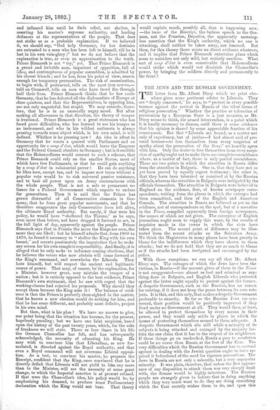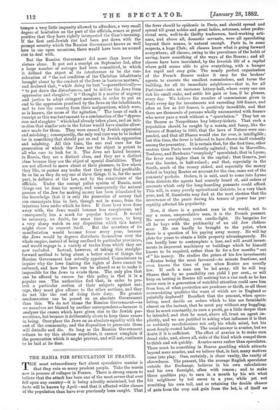THE JEWS AND THE RUSSIAN GOVERNMENT.
THE letter from Mr. Albert Dicey which we print else- where gives some pertinent advice to Liberals. They are "deeply concerned," he says, to "protest in every possible manner against the revival in Russia of the vilest forms of religious persecution." Whether the practice or toleration of persecution by a European State is a just occasion, as Mr. Dicey seems to think, for armed intervention, is a point which it is hardly necessary to discuss, until there is some evidence that his opinion is shared by some appreciable fraction of his countrymen. But that "Liberals are bound, as a matter not only of expediency, but of justice—I had almost said of per- sonal honour—to free themselves from every suspicion of apathy about the persecution of the Jews," we heartily agree with him. Only the desire to free themselves from every suspi- cion of apathy ought not to make them see complete resemblance where, as a matter of fact, there is only partial re-semblance. There are two points in which the atrocities in Russia differ from the atrocities in Bulgaria. One is, that they have not as yet been proved by equally cogent testimony ; the other is, that they have been tolerated or connived at by the Russian officials, whereas the atrocities in Bulgaria were instigated by the officials themselves. The atrocities in Bulgaria were believed in England on the evidence, first, of known newspaper corre- spondents, writing from the places in which the outrages had been committed, and then of the English and American Consuls. The atrocities in Russia are believed as yet on the evidence not of correspondents on the spot, but of a narrative in the evidence, compiled apparently from foreign newspapers, the names of which are not given. The enterprise of English journalism ought soon to supply this want, by the results of inquiries made in the towns in which the riots have taken place. The second point of difference may be illus- trated from the recent attacks on the Salvation Army. We think the Magistrates in many places have been greatly to blame for the indifference which they have shown to these attacks ; but we do not hold that they are as much to blame as if the attacks had been instigated and encouraged by the police.
With these exceptions, we can say all that Mr. Albert Dicey says. The outrages of which the Jews have been the victims, in Russia—if the account given of them in the Times is not exaggerated—are almost as foul and criminal as any- thing done in Bulgaria, and English Liberals who protested against the latter ought equally to protest against the former. A despotic Government, such as the Russian, has no reason for existing, if it does not keep the peace between its own sub- jects. Ibis this, and this only, that makes a despotic Government preferable to anarchy. So far as the Russian Jews are con- cerned, their position would be positively improved if they lived under no Government at all. They would then, at least, be allowed to protect themselves by every means in their power, and they would only settle in places in which the means of protecting themselves seemed to them adequate. A despotic Government which sits still while a minority of its
subjects is being attacked and outraged by the majority for- feits the one claim that it has to the respect of its neighbours. If these things go on unchecked, Russia a prey to revolution
could be no worse than Russia at the feet of the Czar. The very difficulties which the Russian Government has to contend
against in dealing with the Jewish question ought to have ap- prised it beforehand of the need for vigorous precautions. The Jews in Russia are not only a minority, but a very unpopular minority. It was plain, therefore, that unless the first appear- ance of any disposition to attack them was very sharply dealt with, the disease would be highly infectious. The Russian people are strangely given to believe that in doing anything which they very much want to do they are doing something which the Czar secretly wishes them to do, and upon this temper a very little impunity allowed to offenders, a very small degree of hesitation on the part of the officials, comes as proof positive that they have rightly interpreted the Czar's meaning. If the first anti-Jewish riot had been put down with the prompt severity which the Russian Government knows so well how to use upon occasions, there would have been no second riot to deal with.
But the Russian Government did more than leave the rioters alone. It put out a rescript on September 3rd, after a large number of outrages had been committed, in which it defined the object of its interference to be the con- sideration of "the sad condition of the Christian inhabitants brought about by the conduct of the Jews in business matters," and declared that, "while doing its best "—parenthetically-- "to put down the disturbances, and to deliver the Jews from oppression and slaughter," it " thought it a matter of urgency and justice to adopt stringent measures, in order to put an end to the oppression practised by the Jews on the inhabitants, and to free the country from their malpractices, which were,
as is known, the cause of the agitation." The issue of such a rescript as this was tantamount to a condonation of the " o•ppres-
sion and slaughter" which had already taken place, and an inti-
,mation that similar acts in the future would have similar allow- ance made for them. They were caused by Jewish oppression
and misdoing ; consequently, the only real cure was to be looked for in something that should put an end to Jewish oppression and misdoing. All this time, the one real cure for the persecution of which the Jews are the object is patent to all who care to look for it. The Jews are hated because, in Russia, they are a distinct class, and they are a distinct class because they are the object of special disabilities. They are not allowed to move about at their pleasure, to live where they like, to pursue any trades that they may find profitable. In so far as they do any one of these things, it is, for the most part, in defiance of the law, and by the connivance of the officials. Under the corrupt police system of Russia, most things can be done for money, and consequently the natural passion of the Jew for making money has been stimulated by the knowledge that it is only the possession of money that can emancipate him in fact, though not in name, from the injurious laws under which he lives. If these laws were done away with, the Jews would become less conspicuous, and consequently less a mark for popular hatred. It would be necessary, no doubt, for some time to come, to keep a very sharp watch on any disposition which this hatred might show to reassert itself. But the occasions of its manifestation would become fewer every year, because the Jews would by degrees distribute themselves over the whole empire, instead of being confined to particular provinces, and would engage in a variety of trades from which they are
now excluded. Instead, however, of taking this straight- forward method to bring about a better state of things, the Russian Government has actually appointed Commissions to inquire why the laws limiting the rights of Jews cannot be enforced, and how the laws can be altered so as to make it impossible for the Jews to evade them. The only plea that can be offered in excuse for this policy is that it is a popular one. The authorities find that, in order to pro- tect a particular section of their subjects against out- rage, they must give offence to the other sections, and they do not like the cost of doing their duty. No greater condemnation can be passed on an absolute Government than this. We do not blame the Russian Government—as we ourselves are blamed by another correspondent—because it analyses the causes which have given rise to the Jewish per- secutions, but because it deliberately elects to keep those causes in being. Once place the Jews on an absolute equality with the rest of the community, and the disposition to persecute them will dwindle and die. So long as the Russian Government refuses to try this obvious expedient, it cannot complain if the persecution which it might prevent, and will not, continues to be laid at its door.







































 Previous page
Previous page